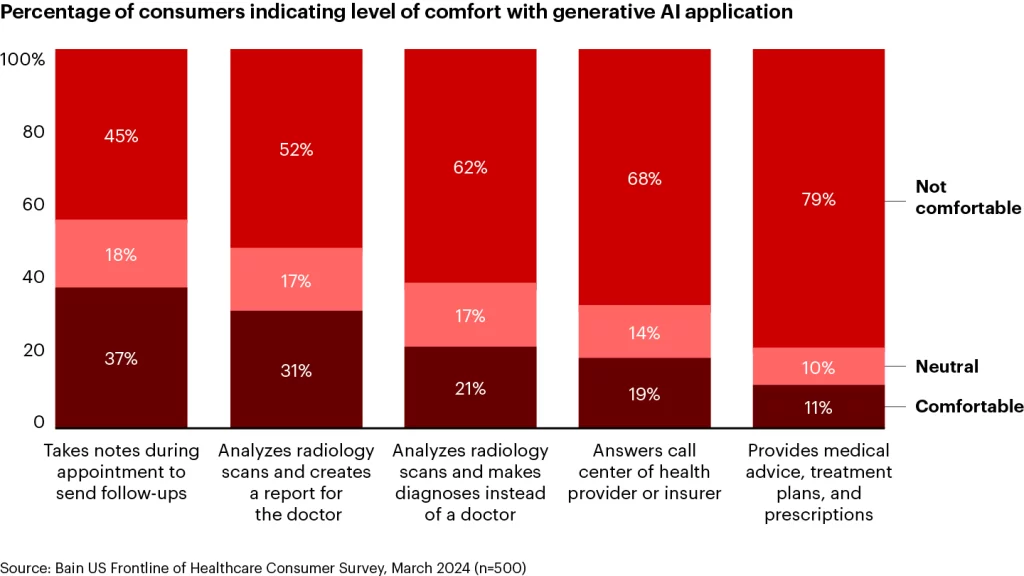
What You Should Know:
– New research from Bain & Company has revealed an intriguing trend in the healthcare industry: U.S. patients are more comfortable with generative artificial intelligence (AI) analyzing their radiology scans and making diagnoses than with AI answering the phone at their doctor’s office. This finding underscores a broader trend where healthcare consumers show a preference for generative AI supporting their doctors rather than interacting directly with the technology themselves.
– The insights are part of Bain & Company’s latest US Frontline of Healthcare survey, which explored the growing role of generative AI in healthcare and the sentiments of both patients and providers toward this emerging technology.
Patient and Provider Sentiments Toward Generative AI
The research indicates that nearly half of U.S. consumers are comfortable with at least one generative AI application in healthcare. While this reflects a cautious optimism, it also highlights the importance of getting the patient experience right from the outset. The data suggests that consumers are wary of directly interacting with AI, preferring that it supports their healthcare providers instead.
Physicians and administrators share a similar mix of excitement and apprehension about the potential of generative AI. According to the survey, 43% of providers see the promise of AI in easing administrative burdens and reducing clinician workloads. However, concerns remain, with 19% of physicians and 17% of administrators worried that the technology could undermine the critical patient-clinician relationship.
Learning from Telehealth: A Precedent for AI Integration
The anxiety surrounding technology’s impact on the patient-clinician relationship is not new. The advent of telehealth sparked similar fears, but the value of the relationship has persisted. Today, 61% of patients who use telehealth do so only with their existing providers, and both patients and physicians have embraced telehealth as a supplement to in-person visits. Around 76% of physicians and 78% of consumers view telehealth as a complement to traditional care, while only a small percentage see it as a substitute.
This precedent suggests that with careful implementation, generative AI can similarly be integrated into healthcare in a way that complements rather than replaces the human elements of care.
Addressing Healthcare’s Biggest Pain Point: Wait Times
Beyond the patient experience with new technologies, Bain’s research highlights a global concern: wait times in healthcare. Across the Asia-Pacific region, the UK, and the U.S., hospital wait times and delays in getting appointments are the most significant pain points for patients, even outranking high costs.
To address these challenges, healthcare providers are exploring alternative care sites and channels, such as urgent care centers, retail healthcare, and telehealth. Currently, more than 70% of consumers are open to seeking care at these alternative sites for various medical conditions.
The Road Ahead for Generative AI in Healthcare
The journey toward widespread adoption of generative AI in healthcare is just beginning. More than 60% of hospital administrators report that their organizations still need to be ready to incorporate AI at scale. Those who succeed will focus on use cases that strengthen the patient-clinician relationship and preserve the human touch that is essential for effective and compassionate care.
For generative AI to be successfully integrated into healthcare, clinician involvement will be crucial from the outset. Engaging clinicians in the development and implementation of AI solutions will help address concerns and ensure that the technology enhances, rather than diminishes, the quality of care.
“We’ve seen patients and providers becoming more comfortable with the role generative AI is starting to play in healthcare, but many providers remain concerned about the technology undermining the essential elements of the patient-clinician relationship,” said Dr. Erin Ney, partner in Bain & Company’s Healthcare & Life Sciences practice. “Done well, generative AI has the ability to alleviate clinicians’ administrative burdens, allowing them to focus more of their time and energy on vital face-to-face interactions with patients. As more applications come to market, it will be important to balance their use with the need to treat patients with compassion, tune into their concerns and emotions, and deliver high quality, individualized care.”
As the healthcare industry navigates this new frontier, the focus must remain on delivering patient-centered care while leveraging the transformative potential of generative AI. By doing so, healthcare providers can harness the benefits of AI while maintaining the trust and confidence of both patients and clinicians.

